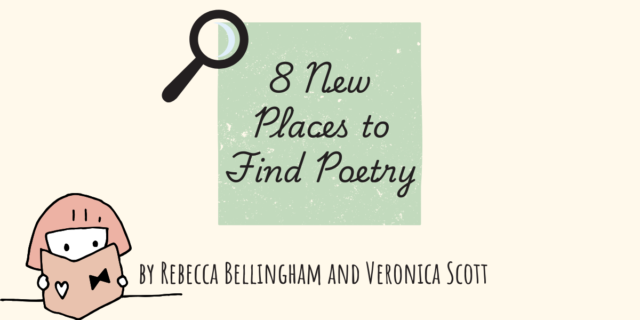
Amy Greenbaum Clark is a Heinemann Fellow with the 2014–2016 class, and has been an educator for 15 years. In today's post, Amy provides an update on her action research project, which asks, "In what ways does the study and composition of poetry impact other modes of student writing; in particular, narrative and scholarly essay writing?"
by Amy Greenbaum Clark
I often marvel at the wonder that is the craft of poetry. Each word exquisitely announcing its purpose; each line break, driving the reader forward yet also a space to deepen meaning; each mark of punctuation placed on the page or its absence, intentional and celebratory of the surrounding words. Images that linger in the mind and lend an effervescence to the heart. The offering of a moment in time—to admire beauty (of language as much as anything), to understand the world, to consider ourselves. A moment to breathe—inhaling the glory asserted, exhaling admiration of craft.
The people in my life get a little (or a lot) exhausted listening to language like this. I married an engineer. I texted him a picture of Nikki Giovanni’s “A Poem of Friendship” the other day. He replied, “Can I send you like really moving calculations?”
Many of my students roll their eyes as if to say, “Really?! Again with the poetry?”
I am not deterred. I know the impact of poetry on the person I have become and I’ve no doubt that it holds that power for all who encounter it…under the proper circumstances. And choice has everything to do with those circumstances because when we offer our students choice, we reveal our trust in them as learners.
Trust.
That’s such a powerful word, and it’s also the hardest part of the choice-filled classroom where danger of the wrong choice seems to lurk around every corner. We wonder and worry. Will they make the right decisions? Will they challenge themselves? Will they learn what’s necessary? Will they score well on that test if I am not completely in charge?
A terrifying ledge to leap from as concerns flurry about, but let’s look at it from another angle.
If students are turning in work just to make a grade or because they have to, what are they really learning? What is the import of enthusiasm and joy in an active learning life? Without a say so in the classroom, is school just school…something we inflict on our kids?
The leap seems a bit more worth the risk in consideration of these questions because the thing we all know as educators is that when we are trusted to teach our kids as we know they need to be taught, we are empowered and invested in our work. Our children deserve that same opportunity.
In offering my students choice in the poems they read and how they respond, I have yet to find a young adult who has left my room not attached to poetry in some way. I haven’t done anything magical. I haven’t micromanaged some grand assignment or created some pretty project. I simply allowed them to encounter the words on the page themselves. I let my kids find the poems that meant something to them. I allowed opportunities for them to talk to each other about poetry conversationally. I freed them to respond to poetry in any way that made sense to them…watercolor, drawing, notes, another poem, etc.
In turn, they embraced the form. In turn, they found themselves composing poetry and discovering poetic voice. In turn, they internalized the importance of finding the right word and applied it even outside of the poetic form. In turn, they have all grown as readers and writers in very meaningful and lasting ways.
I see this power differently in every kid, but this year, I see it most in one senior in particular. Corinne wasn’t a poetry lover, yet found herself placed in my poetry elective. Over the course of time, she grew to appreciate the form and to own it as she wrote her own poetry and allowed it to change the course of her senior project. More importantly, Corinne allowed poetry to be a vehicle to speak about her attitudes toward herself about her weight-something she has struggled with for years-publicly in a classroom of her peers. Her words are ever more poignant than mine:
“[Now] I write my own poems, any form or style of poetry, on my everyday experiences with my weight. Poetry has been a way to express myself in a less constricting way than in normal writing. I can create visual pictures with my words and writings that you can’t do in traditional paragraph form like what I am doing right now. I can creatively craft my language and writing…It isn’t always easy but it works for me…The more I wrote the word “fat” the easier it got. That isn’t a word that I am comfortable saying, for obvious reasons. I wasn’t comfortable saying the poems out loud either because they are so personal but I knew I had to share them. There are people like me out there who hold baggage and need someone to relate to. I printed out all the poems for everyone to read in the class for themselves. It was hard to share my work with others. I doubted my ability to write, to convey meaning and depth, and my will power to share such a personal thing… If I hadn’t gotten to choose my own topic and be allowed to change it, I would have never made such a discovery about myself. There are so many things about ourselves that we don’t know or that we have forgotten.”
After Corinne courageously shared her poems with the class and spoke about why it was so important to her to share them, nearly every kid in the room shared his/her own story about how they are also self-conscious in one way or another.
Trust.
There is great power in handing over control of learning to our kids and allowing them to feel empowered by it rather than submissive to it. And sometimes it simply allows for kids to trust each other in a safe and respectful learning environment.
♦ ♦ ♦ ♦
Heinemann Publishing is seeking applicants to become part of our newest class of Heinemann Fellows, a small group of educators who exhibit exceptional promise for concentrated, enhanced pedagogy.
Click here to learn more and apply.

Amy Greenbaum Clark is an English teacher at Christ Episcopal School in Covington, LA. Her action research question as a Heinemann Fellow is, "In what ways does the study and composition of poetry impact other modes of student writing; in particular, narrative and scholarly essay writing?"
Follow Amy's progress on Twitter @AmyGClark


